#Traditional textiles of Hakata
Explore tagged Tumblr posts
Text
日本のトリビアまとめ #0002
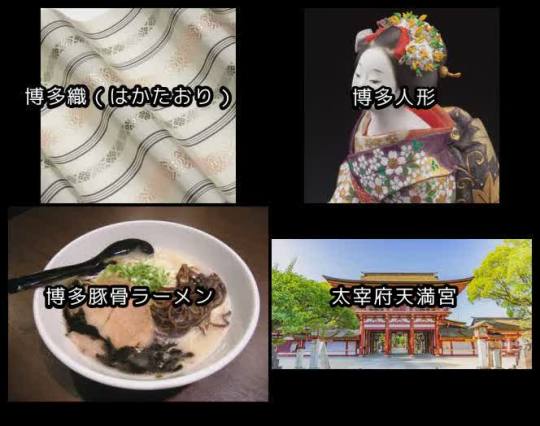
#博多���伝統工芸#Traditional textiles of Hakata#博多の食文化#博多織(はかたおり)#Hakata Tonkotsu ramen#Traditional crafts of Hakata#だざいふてんまんぐう#福岡の織物#Hakata food culture#Hakata-ori#Dazaifu Tenmangu Shrine#Dazaiftenmanguu#Japanese Trivia#Hakata doll#博多人形#太宰府天満宮#博多豚骨ラーメン#日本のトリビア
0 notes
Photo
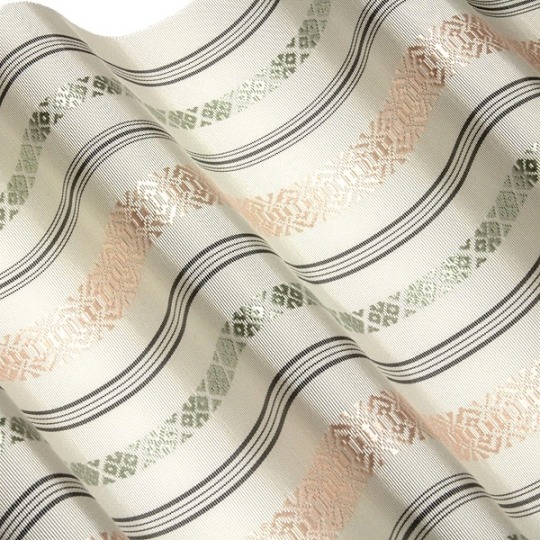
博多織(はかたおり) 福岡の織物
博多織(はかたおり)は、福岡市内の博多地区で伝統的に製造される絹織物の一種です。以下に、博多織に関する詳細を述べます。 1. 歴史と起源 博多織は、約1300年以上もの歴史を持っています。平安時代から存在しており、最初は宮廷や貴族のために製作されていました。その後、江戸時代には町人や商人の間で広まり、現在に至るまで続く伝統工芸品として発展しました。 2. 特徴 博多織の特徴は、鮮やかで美しい色使いと独特の柄です。糸を縦糸(たていと)��横糸(よこいと)に使い分け、複雑な織り方で独自の模様を作り出します。幾何学的な柄や華やかな花模様、風景など、多彩なデザインがあります。 3. 製法 博多織の製法は非常に緻密で手間がかかります。細い絹糸を使い、特殊な織り機で1つ1つ手作業で織り上げられます。熟練した職人の技術が求められ、高度な技術と経験がなければ作ることができません。 4. 用途 博多織は、着物や帯、小物、家具の張り地、バッグ、アクセサリーなど、さまざまな製品に使用されます。その美しさや高級感から、贈り物や特別な行事にも重宝されます。
♪♫♬🎤🎹🎶♪♫♬🎤🎹🎶♪♫♬🎤🎹🎶♪♫♬🎤🎹🎶
Hakata-ori Traditional textiles of Hakata
Hakataori is a type of silk fabric traditionally produced in the Hakata district of Fukuoka City. Below are details about Hakataori. 1. History and Origin Hakata-ori has a history of over 1300 years. It has been around since the Heian period, and was first produced for the imperial court and aristocrats. Later, during the Edo period, it became popular among townspeople and merchants, and developed into a traditional craft that continues to this day. 2. Characteristics Hakata-ori is characterized by its bright and beautiful colors and unique patterns. The threads are used differently for warp and weft to create unique patterns through intricate weaving. There are a variety of designs, including geometric patterns, gorgeous floral patterns, and landscapes. 3. Manufacturing method The manufacturing method of Hakata-ori is very precise and time-consuming. Each piece is woven by hand using a special loom using thin silk threads. It requires the skills of a skilled craftsman, and cannot be made without advanced technology and experience. 4. Applications Hakata-ori is used in a variety of products such as kimonos, obi obi, accessories, furniture upholstery, bags, and accessories. Due to its beauty and luxury, it is also useful as a gift or for special occasions.
0 notes
Text
Japan Day 24
Today was the first day in a while I genuinely felt happy from morning to night (okay a few angry spikes but I was able to calm down pretty fast). I’ve been dreading this day honestly cause originally I was supposed to confront the issue when I headed to Hakata but it didn’t happen due to the other party and I was afraid of how heavy my heart would feel. But instead from the moment I woke up, I felt ready to tackle the world. I left Hiroshima today and took the Shinkansen down to Fukuoka. As I left Hakata station I was greeted by a farmer’s market, unfortunately they weren’t open yet and I didn’t think I’d get a chance to come back so I took as much of a look around the perimeter as I could. I headed to my dorm at The Life Hostel & Bar Lounge to drop off my stuff. I was greeted by the funniest employee. He was so elated when he heard I was from California and he kept giving me fist bumps. It was endearing. Once I dropped my things off I headed out for the day still trying to figure out what to do.
Despite everyone telling me to visit Ohori Park, I decided to go with my gut and go to a further location. The bus there was infrequent and long but I took my time strolling to the stop. On the way I passed by Kushida Shrine which had one of the most impressive displays I’ve seen yet at any shrine or temple

From there I continued my wandering and ended in the Hakata Old Town Area. I passed by the Hakata Traditional Craft and Design Museum which has free admission and some very informative and well-written displays about traditional Hakata textiles and doll design.

The centerpiece of the museum is this statute of the Fuku No Kami, a common motif of Hakata.
I continued to the bus stop and had the opportunity to explore the Kawabata Shopping Arcade. Their selection here is slightly different than other shopping arcades I’ve visited so I had a lot of fun exploring. I especially loved one shop that specialized in soy bean cosmetic goods and drinks. The amazake soy milk was so fresh and delicious. After the endless detours I did eventually make my way to the bus stop and to Uminonakamichi Seaside Park. I wasn’t quite sure where to go so I first headed left (facing Marine World) and ended up at a big empty green field by the water with an open BBQ restaurant connected to a small looking resort. I ended up going into The Luiganz resort for a delicous farm to table buffet lunch.


Gorgeous dining room with a view of their pool and some towering palm trees.
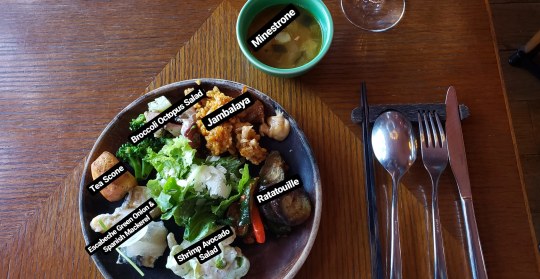

The selection was limited but the quality of the ingredients were excellent and the price was very reasonable at around $20.
After lunch I headed in the other direction and into the proper seaside park area. You can rent a bike for about $5 for the whole day and just bike this massive place. There’s so many paths I know I didn’t get to explore nearly all of them. There’s everything from a bird sanctuary to vast flower fields. Everything about the process was so simple.


Tons of gorgeous and fun spots but the best spot was definitely the

The Shiomidai Lookout where you can get a lovely panoramic view of the Genkai-nada Sea. There was just no one here and it was such a lovely place to unwind.
I’m not sure how long the entire bike ride was but it was definitely worth the pocket change. I took the railways back and ended up at Hakata Station where the Farmer’s Market was now in full swing.

I picked up some pre-dinner snacks and walked around before getting on the totally wrong bus and ending up in the Tenjin area. I walked around for a bit before finally heading back to my hotel to settle in so I could get going to the Yatai stalls by the river. The walk there was interesting since it’s through Hakata’s red light district. The place was crowded but not too too overrun. Most places didn’t have an English menu so I made a complete guess about where to eat but I chose the stall with the granny cooking because that’s where the best meals come from!
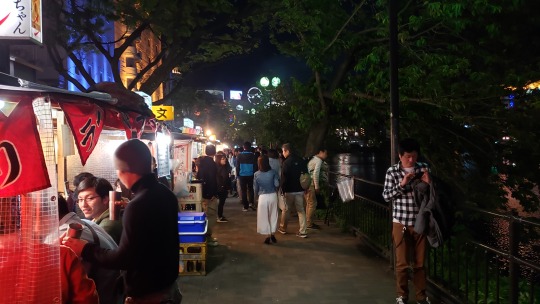

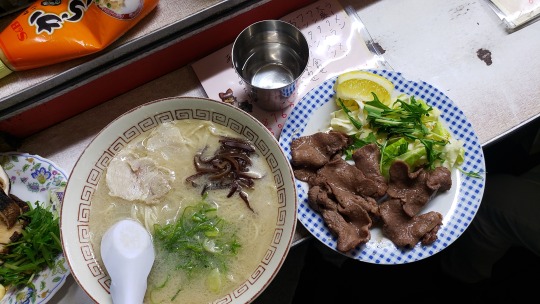
Such a fun experience getting crammed into a stall and trying to juggle your meal. Gorgeous river views too (if you’re willing to turn back and actually look at it).
I ended the night with a convenience store dessert before heading off to bed for my next big day.

All the extra little snacks I picked up on the way. I cannot stop eating here...
#Japan#Japanese Food#Food Blog#Food Blogger#Travel Blog#Travel Log#Travel Blogger#japanese#Asia#Asia Trip#Traveling Couch Potato#wanderl#explorepage#Hiroshima#japan tourism#nature#flowers#mobile photography#explore#explore food
15 notes
·
View notes
Text
explore japanese culture through digital art exhibition CULTURE GATE to JAPAN

from the mysterious soundscapes of hokkaido’s indigenous ainu people to the historic artisan crafts of the island of kyushu and more, japan is home to many diverse cultures. CULTURE GATE to JAPAN sees 29 creatives working in arts, entertainment, animation and manga reinterpret the appeal of these rich cultural resources through a series of digital art exhibitions, each molded by their particular region. airports – the gateways to these unique areas – host the multi-media work, inviting visitors to connect with people and discover new cultures. sightseers can enjoy the artwork and attractions in person or digitally from anywhere in the world.
running from february until at least september 2021 at seven airports across japan and tokyo international cruise terminal, step through the CULTURE GATE to JAPAN today – here.
yusuke shigeta shows samurai engaged in battle through an animation on a reimagined traditional folding screen all images courtesy of CULTURE GATE to JAPAN
under the theme of motion, artist yusuke shigeta and creative group EUPHRATES evoke the movement of the region’s samurai warriors and ninjas at the chubu centrair international airport. artist shigeta reimagines traditional folding screens to show samurai engaged in battle through vivid animation. through lights, EUPHRATES recreates signs that ninjas gave as they engaged in espionage. once stepping through the airport, visitors are welcomed into the aichi prefecture, once home to some of the most famous warriors, and the cities of iga in the mie prefecture and neighboring koka in shiga prefecture, considered the birthplace of the ninja.
EUPHRATES depicts the signs given by ninjas through the use of pinpoint lights
from arita-yaki ceramics to hakata-ori textiles and satsuma kiriko cut glass, the wide variety of patterns found on the crafts of the island of kyushu inspired the works by artists mirai mizue and macoto murayama at fukuoka airport. using animations, mizue’s work turns these native patterns into living and breathing creations. murayama uses a 3D modelling tool to create original graphics of chrysanthemum, inspired by the botanical paintings traditionally used to decorate arita. his botanical diagrams, which are so detailed that they resemble sophisticated architectural drawings, are in turn used to decorate new arita as well.
(above) macoto murayama paints architectural botanical patterns on arita ceramic (top) mirai mizue’s work turns these native patterns into living and breathing creations
the okinawa archipelago of over 160 islands at the very south of japan has distinct goods, crafts and culture inspired by its past as the ryukyu kingdom. at naha airport, a visually stunning wall mural created by retro pop animator and illustrator nuQ mixes motifs of the historic shurijo castle – partially lost to fire in 2019 – and ryukyu-style karate with the tourists and banana boats of the present day. visual artist satoru higa’s artwork in the mural uses a 3D model of the castle to return it to its former glory in digital, as it is set to be actually rebuilt by 2026.
(above) satoru higa’s mural recreates the shurijo castle in digital form (top) nuQ’s wall mural mixes motifs from the past and present of the okinawa archipelago
under the supervision of paola antonelli, senior curator architecture & design at MoMA, the CULTURAL GATE to JAPAN at tokyo’s handea and narita airports seek to explore the concept of vision from past to future, and its role as the foundation of japanese culture. six videos by six different artists – acky bright, jun inoue, sachiko kodama, mariko mori, monika mogi, and PARTY – usher travellers into the country’s extraordinary rich and eclectic culture. broadcasted in synchronized sequence along the path leading from each arrival gate, they each highlight a different aspect of the country’s creativity and reality, arranging distinct styles and contexts in surprising juxtapositions.
at tokyo’s handea and narita airports, jun inoue’s hitoshobu work captures the artists spiritual, abstract live painting, which builds upon the ephemeral nature of the world of sho/calligraphy
at tokyo international (haneda) airport, visitors are welcomed to an installation by sound artist and designers yuri suzuki and musical artist and composer miyu hosoi. keeping the human voice at the core of their proposal, the duo distilled the sounds of the japanese language – hiragana sounds that consist of 46 base characters with five singular vowels, 40 consonant-vowel unions and one singular consonant – to create a unique composition. dozens of standing horns then appear to converse with each other like people waiting for friends and relatives in the arrival hall of an airport.
yuri suzuki and miyu hosoi score a unique composition that welcome visitors through dozens of standing horns in their ‘crowd cloud’ (2021) installation photo by takashi kawashima
at new chitose airport in hokkaido, the CULTURE GATE to JAPAN enriches an empty space with various media to create an all new, multisensory experience. under the theme of invisible, creative company NAKED, INC. creates moments where visitors feel the language and spirit of the ainu culture through sound. this is using unwritten, unspoken auditory transmissions.
NAKED, INC. creates an invisible experience where visitors feel the language and spirit of the ainu culture through sound
as the gateway to major cities of osaka, kyoto and wider kansai region, kansai international airport’s installation focuses on the theme of life. the region is divided into eight distinct areas. as such, the exhibition includes eight manga artists who formed murals showing the unique culture of each area as well as their harmonious coexistence with nature. visit the CULTURE GATE to JAPAN website to see the installation at kansai international airport online when it launches in late march.
exhibition info:
organizer: agency for cultural affairs, government of japan
exhibition venue: new chitose airport, narita international airport, tokyo international (haneda) airport, kansai international airport, chubu centrair international airport, fukuoka airport, naha airport, and tokyo international cruise terminal
dates: february 2021 to at least september 2021
This content was originally published here.
0 notes
Photo

Hakata Old Town Light Up Walk 2018: Weave lights, Color emotions
It is the annual autumn festival in Fukuoka City and it started to celebrate the 20th anniversary of Fukuoka Urban Beautification Award. It is the 13th time this year and for 5 days, on average, one hundred and thirty thousand people visit this event. The concept of this year is “Hakata-ori(textiles)” which is 777 years old in 2018. this year Fukuoka is second only to Kyoto, in its number of shrines and temples, but people don’t know much about this fact. We hope lots of people find and enjoy the history and the features of temples in this long autumn night. Normally, it is not allowed to enter these temples but only during this event, you can enjoy the fantastic night view which is illuminated beautifully.
Date and Locations 1. Date:31st of October (Wed) ~ 4th of November (Sun), 17:30~21:00, 2018 2. Location 1) Charged Jotenji Temple, Tochoji Temple, Myorakuji Temple, Engakuji Temple, Myotenji Temple, Shojoji Temple, Hongakuji Temple, Zendoji Temple, Kaigenji Temple, Ryuguji Temple 2) Free Entrance Kushida Shrine, Hakata Sennen-no-mon, Katsuragi Jizouson 「Hakatamachiya」 Furusatokan, Hakata Traditional Craft and Design Museum
Website:http://hakata-light.jp/ Facebook:https://www.facebook.com/hakatalight/
0 notes